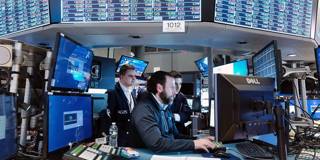Just because there is no hedge for Armageddon doesn't mean that investors should ignore existential risk. Continued bullishness in the face of a heightened risk of nuclear war suggests that stock markets may now be in an apocalypse-denial bubble.
NEW YORK – Since the start of Russia’s invasion of Ukraine, much has been written about the increased risk of nuclear annihilation and its impact (or lack thereof) on stock-market valuations. But, leaving aside the issue of whether stocks are overpriced or underpriced, an equally pertinent question is whether existential risk can be ignored entirely from a financial perspective.
In a recent note titled “Rising Risk of a Nuclear Apocalypse,” Peter Berezin, the Chief Global Strategist at BCA Research, argues that although the probability of a civilization-ending nuclear conflict in the coming year has risen (in his view) to 10%, investors should “stay bullish on stocks” over a 12-month horizon. The reason is that, although stock prices will fall if there is a nuclear war – and could even reach zero in the case of nuclear Armageddon – so will the price of every other asset (if asset markets survive). Since you cannot hedge the risk of a nuclear war, Berezin thinks you should stay long on assets whose value will rise if nuclear war is avoided.
It is certainly true that you cannot hedge apocalypse risk, and that it therefore makes sense to go long on assets whose value will otherwise increase. But this proposition is not helpful unless you know which assets will go up in value from their current levels if nuclear war is avoided (for the time being) or if its likelihood is at least reduced.

NEW YORK – Since the start of Russia’s invasion of Ukraine, much has been written about the increased risk of nuclear annihilation and its impact (or lack thereof) on stock-market valuations. But, leaving aside the issue of whether stocks are overpriced or underpriced, an equally pertinent question is whether existential risk can be ignored entirely from a financial perspective.
In a recent note titled “Rising Risk of a Nuclear Apocalypse,” Peter Berezin, the Chief Global Strategist at BCA Research, argues that although the probability of a civilization-ending nuclear conflict in the coming year has risen (in his view) to 10%, investors should “stay bullish on stocks” over a 12-month horizon. The reason is that, although stock prices will fall if there is a nuclear war – and could even reach zero in the case of nuclear Armageddon – so will the price of every other asset (if asset markets survive). Since you cannot hedge the risk of a nuclear war, Berezin thinks you should stay long on assets whose value will rise if nuclear war is avoided.
It is certainly true that you cannot hedge apocalypse risk, and that it therefore makes sense to go long on assets whose value will otherwise increase. But this proposition is not helpful unless you know which assets will go up in value from their current levels if nuclear war is avoided (for the time being) or if its likelihood is at least reduced.